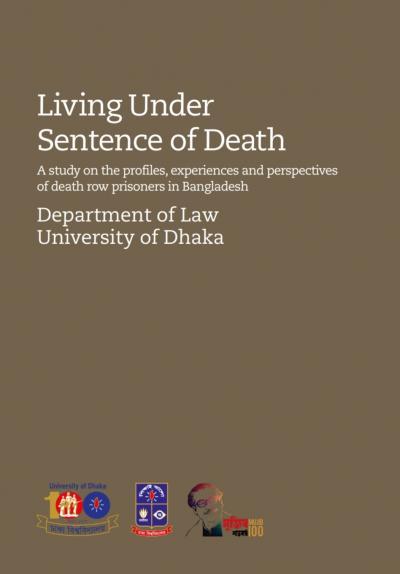
https://www.law.ox.ac.uk/research-and-subject-groups/death-penalty-resea...
Bangladesh not only retains the death penalty for a wide range of offences, but actively carries out executions. The number of death row prisoners is also rapidly rising. While there were 1009 death row prisoners in November 2011, the number has jumped to 2000 as of June 2021. Nonetheless, the death penalty regime in Bangladesh attracts little public debate or discussion. Similarly, beyond these basic numbers, almost nothing is known about the death row prisoners; their demographics and experiences of prolonged, extreme, and indeterminate interactions with the criminal justice system remain largely unexplored as well.
In an attempt to bridge this knowledge gap, the Department of Law at the University of Dhaka, in collaboration with Bangladesh Legal Aid and Services Trust (BLAST) and The Death Penalty Project, conducted an empirical study, the first of its kind in Bangladesh, to explore the socio-economic profiles of death row prisoners in Bangladesh, and to elicit their experiences as well as perspectives on the criminal justice system’s approaches to capital crimes in general. The report of the study, titled ‘Living under sentence of death: A study on the profiles, experiences, and perspectives of death row prisoners in Bangladesh’, which was officially launched by the University of Dhaka in March 2022, takes a nascent step and begins a long-overdue conversation by addressing some important issues that have been hiding in plain sight.
The study highlights that, apart from those under anti-espionage laws, the law on international crimes, and laws relating to defence forces and paramilitary forces, there are 33 death penalty offences in Bangladesh, 25 of which are non-fatal offences. The fact that 14 of these 33 offences have been introduced in the past two decades (i.e., since 2000) clearly indicates that contemporary lawmakers are increasingly relying on the death penalty in penal policy. The study raises concerns that executions have also increased significantly during the past two decades. From 2001-2019, only two years (2014 and 2018) were without any executions. While there were 11 executions during the period 1991-2000, this number climbed to 57 between 2001-2010 and to 30 from 2011-2019.
The study demonstrates that the death penalty in Bangladesh is disproportionately used against vulnerable and marginalized sections of society, along the lines of economic status, social identity, and levels of educational attainment. Most death sentenced prisoners in this study had low levels of educational attainment; the majority (87%) had no qualifications beyond secondary school level and 15% had no formal education at all. More than half of the death sentenced prisoners (53%) were either in low-paid work or unemployed, with almost three-quarters of them being economically vulnerable (72%). None of the prisoners under the study belonged to the upper or upper-middle classes of socio-economic strata. None of the prisoners had prior convictions and 74% of them had no reported delinquent records.
Most respondents expressed significant dissatisfaction with the quality of the legal investigation, with at least a third of the families claiming that the inmates were tortured in custody to extract confessional statements. Interviews also indicate that the use of torture as a tool of investigation may have become normalized or at least been accepted to some extent. Most respondents (60% of those responding) were not satisfied with the trial process. Most felt that the trial courts failed to properly appreciate the evidence and wrongly relied on false evidence adduced by the prosecution. In terms of the quality of legal representation, two-thirds of interviewees who responded appeared to be satisfied, while one-third were discontented, particularly with the quality of state-funded legal representation for capital defendants.
Another worrying finding was the enormous delay in proceedings largely responsible for prolonged detention of inmates and their protracted isolation on death row. In almost half of cases, the process from the filing of the cases to their disposal by the High Court Division (HCD) took more than 10 years. On an average, the cases had to spend four and a half years (from the date of registration of case) waiting for adjudication by the trial courts and, thereafter, another five and a half years for disposal by the HCD. Almost all families suffered huge financial losses and agony as a result of the drawn out legal proceedings against the prisoners, as nearly a quarter of the prisoners had generated the sole income for their family. The families of more than half of the prisoners were subjected to harassment by local people as well, forcing four families to relocate.
This long-overdue study not only exposes flaws in the justice process but also uncovers some important dimensions of the personal and family-level impacts of death penalty litigation and suggests that a more comprehensive study of death row prisoners in Bangladesh is sorely needed. The study rightly concludes that:
“Rigorous data on the criminal process in capital cases and the many impacts of the death penalty regime in Bangladesh are needed to challenge assumptions about the administration of the death penalty. . . . Ignoring the gravity of the situation will only result in more detrimental effects on prisoners and their families. The sacrifice of fairness and justice in pursuit of executions cannot be a morally defensible position for any society.”
The 'Living under sentence of death’ report can be read in full on The Death Penalty Project website here.
Muhammad Mahbubur Rahman is a Professor at the Department of Law, University of Dhaka. He received his PhD in criminal law from the School of Oriental and African Studies (SOAS), University of London. His research interests include criminal law, human rights, and law and society. He is the author of “Criminal Sentencing in Bangladesh: From Colonial Legacies to Modernity” (Leiden/Boston: Brill Nijhoff, 2017).
Psymhe Wadud teaches law at the Bangladesh University of Professionals. She completed her undergraduate and postgraduate studies in law at the University of Dhaka, graduating with distinction. Her research interests focus primarily on international human rights law, constitutional law, criminal law, and gender justice.











Add new comment